

— Products —
 Consumer hotline +8618073152920
Consumer hotline +8618073152920 WhatsApp:+8615367865107
Address:Room 102, District D, Houhu Industrial Park, Yuelu District, Changsha City, Hunan Province, China
All products
8 inch Rain Gage is a high-precision rain sensor designed for high-standard environmental monitoring. It strictly follows the national standards of SL61-2003, GB11831-89 and GB11832-89 to ensure the accuracy and reliability of data. It is suitable for meteorology, hydrology, agriculture, urban water resource management and other fields, providing key data support for flood prevention and warning, reservoir scheduling and environmental research.
Tel/WhatsApp:+8615367865107
Email:Arvin@niubol.com +Nearly 100 partner company in more than 68 countries. We are committed to providing high-quality, practical products to meet your needs and help you solve problems.Product Details
8 inch Rain Gage is a high-precision rain sensor designed for high-standard environmental monitoring. It strictly follows the national standards of SL61-2003, GB11831-89 and GB11832-89 to ensure the accuracy and reliability of data. It is suitable for meteorology, hydrology, agriculture, urban water resource management and other fields, providing key data support for flood prevention and warning, reservoir scheduling and environmental research.
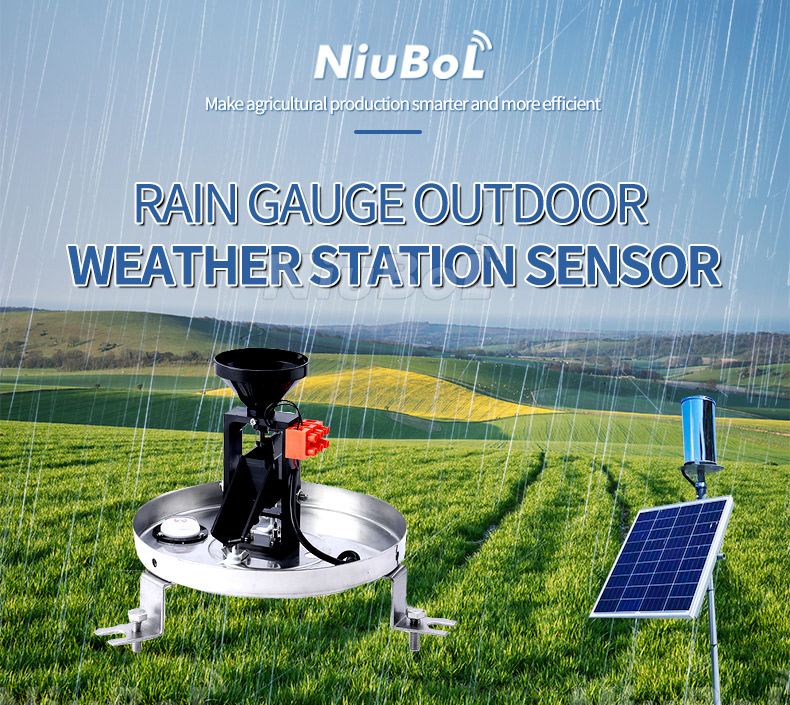
| Bearing water caliber: | Ф200 ± 0.6mm |
| Measuring range: | 0-4mm/min (precipitation intensity) |
| Resolution: | 0.2mm (6.28ml) |
| Accuracy: | ± 4% (indoor static test, rain intensity of 2mm/min) |
| Power supply: | DC 5V, DC 12V-24V or other (optional) |
| Output: | switch signal (reed switch), voltage 0 ~ 2.5V, voltage 0 ~ 5V, RS485 or other (optional) |
| Instrument cable length: | standard 5 meters (other lengths are optional) |
| Operating temperature: | 0 ~ 50 ℃ |
| Storage temperature: | -40 ℃ ~ 80 ℃ |
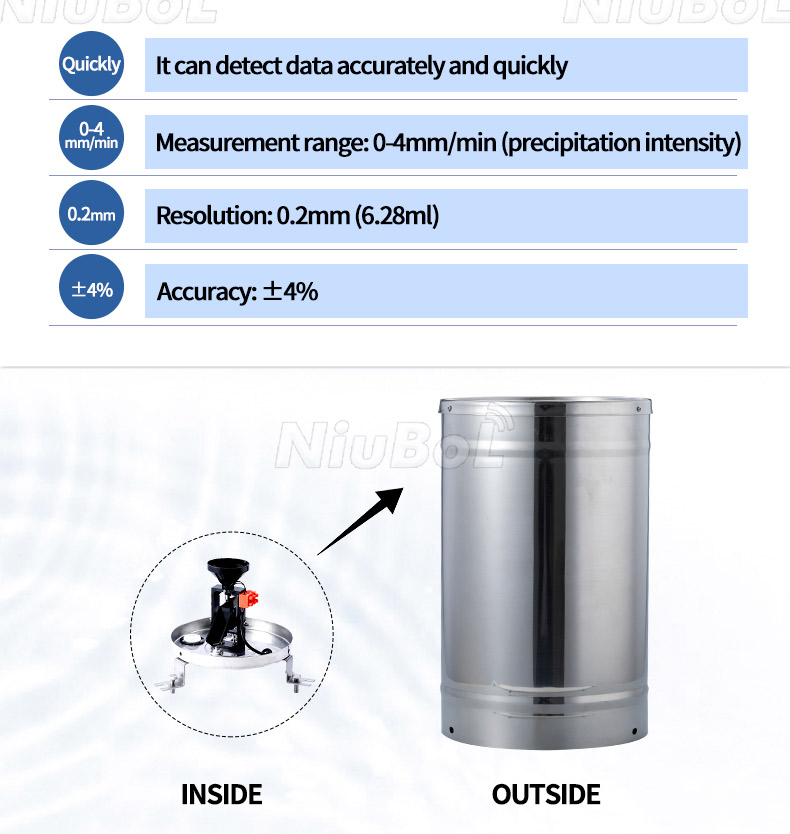
- Accurate measurement: Ф200mm ± 0.6mm water-bearing caliber (8 inch), to ensure that a wide range of precipitation intensity of accurate capture, resolution of 0.2mm (6.28ml), to ensure that each drop of rain are accurately measured.
- Wide Range Adaptation: Supports 0-4mm/min precipitation intensity measurement, covering the full range of precipitation conditions from drizzle to heavy rain.
- High accuracy and stability: ±4% accuracy at 2mm/min rainfall intensity under indoor static test, ensuring data reliability.
- Flexible Outputs: Provides a variety of output forms, including switching signals, voltage signals (0~2.5V, 0~5V), and RS485 digital communication, adapting to different system integration needs.
- Easy Installation and Maintenance: Simple and intuitive installation process ensures the accuracy of measurement after leveling and reduces daily maintenance cost.
- Intelligent calibration: Self-calibration by injecting quantitative water ensures accurate data and simplifies the maintenance process.
- Customized service: Provide personalized configurations such as line length and output form to meet specific project requirements.
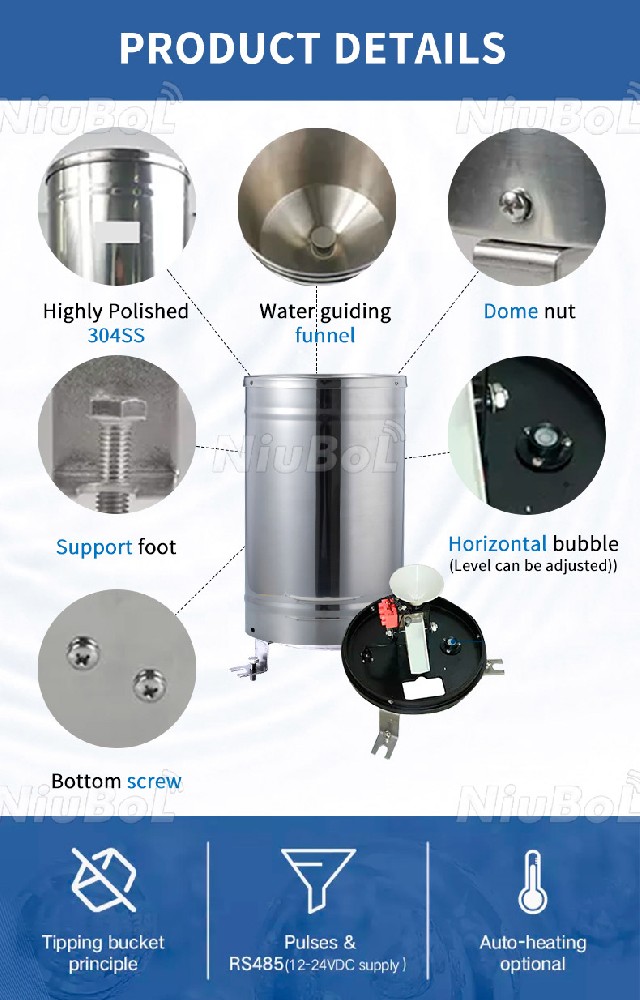
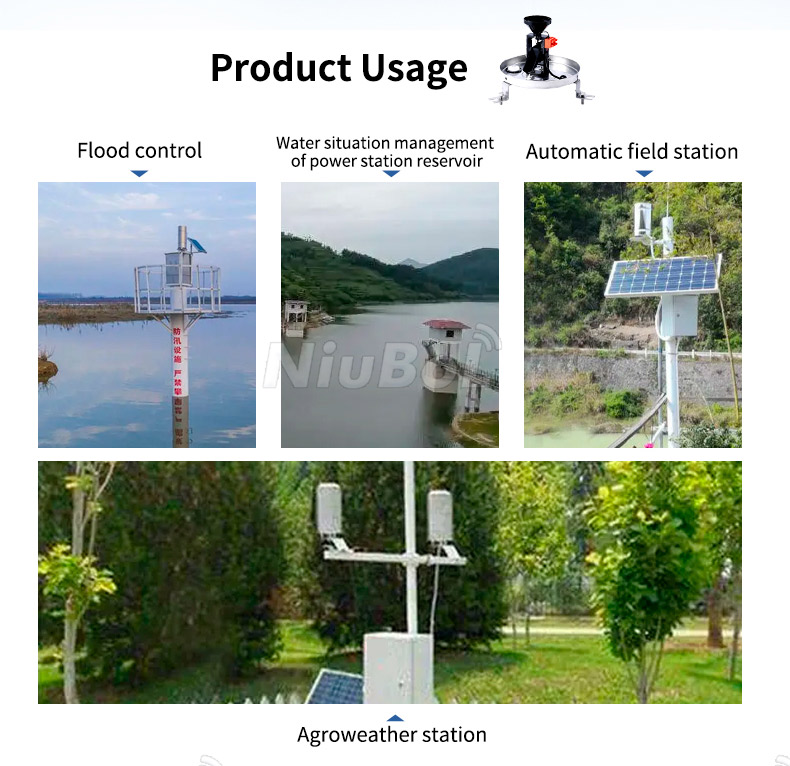
1. meteorological monitoring stations: deployed in national and local meteorological stations, real-time monitoring of precipitation, providing data basis for weather forecasting.
2. Hydrological automatic reporting system: Used for water monitoring of rivers and reservoirs, assisting in decision-making for flood warning and water resource management.
3. Agricultural irrigation management: accurately assessing the water demand of farmland, optimizing irrigation plans and improving the efficiency of water resource utilization.
4. urban drainage system: monitoring urban precipitation, helping to plan and optimize the drainage system to reduce the risk of flooding.
5. environmental research: long-term monitoring of precipitation changes, research on the impact of climate change on precipitation patterns, providing data support for environmental protection.
6. agriculture and forestry management: monitoring precipitation in agricultural and forestry areas, guiding agricultural production and forest fire prevention.
7. Defense sector: used for environmental monitoring around military facilities to ensure the smooth progress of military operations.
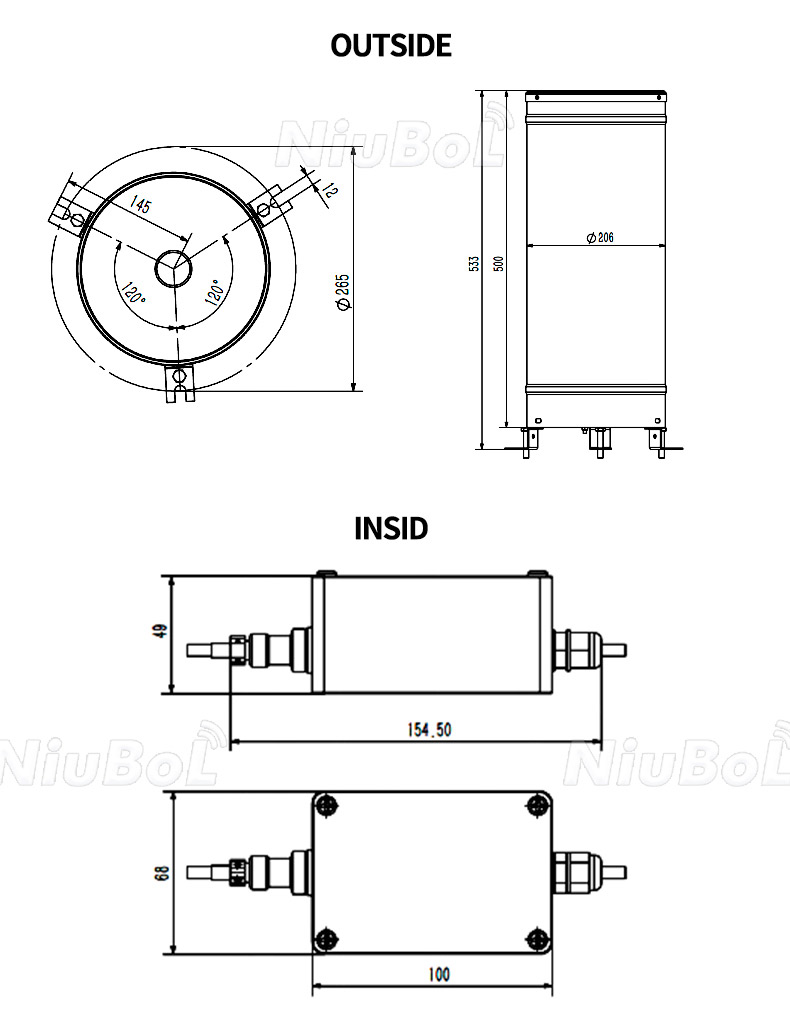
- Adjust the three leveling screws on the chassis so that the leveling bubble indicates level.
- Slowly tighten the expansion screws for fixing to ensure that the sensor is stable.
- If the leveling bubble changes, readjustment is required.
3. Sensor assembly: assemble and fix the sensor according to the diagram.
4. Function test: After fixing, open the rain barrel, cut off the nylon tie on the funnel, fill in water to check the tipping of the bucket and the data reception of the collecting instrument.
- Avoid disassembling the sensor during installation to ensure correct installation.
- Do not connect the wires with electricity, and do not turn on the electricity until the wiring is completed and checked.
- Sensor wire length will affect the product output signal, do not change the welded components or wires.
- Regularly check the sensor, remove dust, mud, sand and other debris to ensure that the water flow channel is smooth.
- When there is dirt on the inner wall of the tipping bucket, it can be rinsed with water or alcohol, and it is strictly prohibited to wipe it with fingers or other objects.
- During winter icing, the instrument should be out of use and taken back indoors for storage.
- Check the package and model number: Please check whether the package is intact, and check whether the product model number is consistent with the selection.
- Safe wiring: Do not wire with electricity, check that the wiring is correct before turning on the power.
- Avoid alteration: the sensor wire length will affect the product output signal, do not change the welded components or wires.
- Regular maintenance: check the sensor regularly, remove dust, mud and sand and other debris to ensure that the water flow channel is smooth.
- Cleaning the tumbler: when there is dirt on the inner wall of the tumbler, it can be rinsed with water or alcohol, and it is strictly prohibited to wipe it with fingers or other objects.
- Winter use: During winter icing, the instrument should be out of use and taken back indoor for storage.
- Save certificates: Please save the calibration certificate and certificate of conformity and return them with the product when repairing.
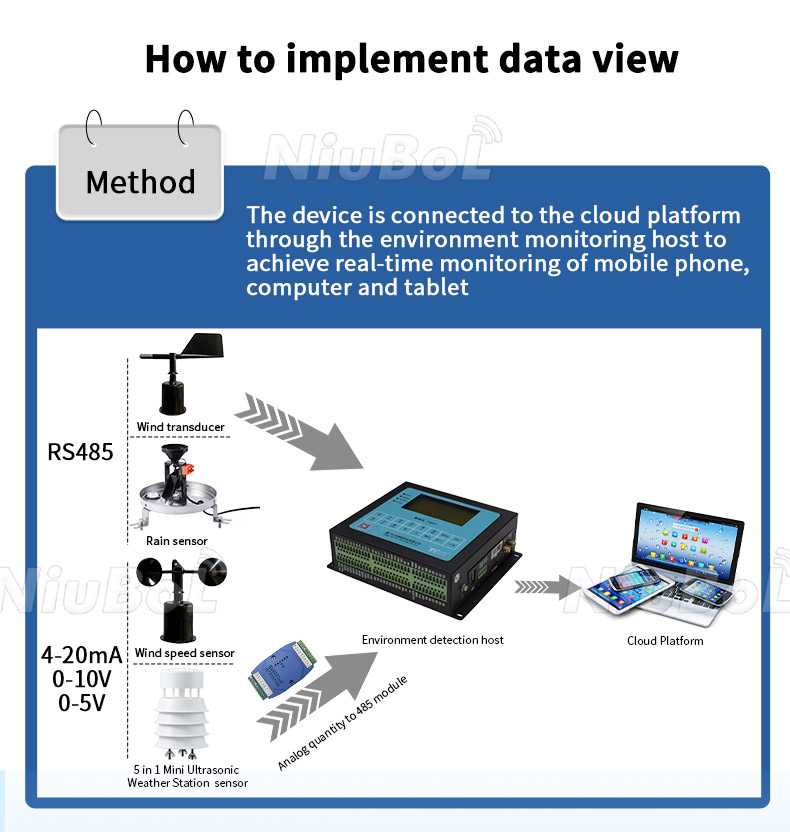
Integrating the 8 inch Rain Gage into other equipment or systems typically involves the following key steps and technical points:
- The 8 inch Rain Gage provides a variety of output forms, including switching signals, voltage signals (0~2.5V, 0~5V), and RS485. depending on the reception capabilities of the target system, select the most appropriate communication method. For example, if the target system supports digital communication, RS485 is an ideal choice because it supports long-distance transmission and is resistant to interference.
- For RS485 interface, you need to make sure that the sensor and the receiving device use the same communication protocol and baud rate. RS485 usually adopts Modbus RTU protocol, which needs to be configured on the system side with the corresponding read commands to get the data.
- Verify that the power requirements (DC 5V, 12V-24V) of the 8 inch Rain Gage match the power output of the integrated system to ensure stable power supply.
- Follow the installation instructions to ensure that the Rain Gage is mounted in the proper location and wired correctly. For outdoor installation, also consider protecting the connection points from the environment.
- After integration, code or configuration software needs to be written on the system side to properly parse the data received from the rain gauge. For applications requiring high accuracy, field calibration may also be required to ensure the accuracy of the measured data.
- Once integration is complete, system testing is performed to simulate precipitation and verify that the data are accurately and correctly transferred to and displayed through the system or further processed. This step includes checking the real-time, accuracy, and stability of the data.
- For complex systems such as weather monitoring networks or automated irrigation systems, integration at the software level is critical. Ensure that rainfall data can trigger appropriate automated processes, such as alarms, data analysis or control actions.
- After integration, regularly check the stability of the communication connection and the performance of the rain gauge to ensure long-term operational reliability.
The 8 inch Rain Gage is more than just a piece of technology, it's a powerful tool for environmental monitoring. With excellent performance, flexible configuration and easy maintenance, it is an indispensable tool in the professional field, contributing to the protection of the natural environment and the safety of human life. When you choose the 8 inch Rain Gage, you choose precision and trust.
Sensors & Weather Stations Catalog
Agriculture Sensors and Weather Stations Catalog-NiuBoL.pdf
Weather Stations Catalog-NiuBoL.pdf
Related recommendations
 Multi-Depth Soil Sensor RS485
Multi-Depth Soil Sensor RS485 TDR Soil Moisture Sensor
TDR Soil Moisture Sensor Pyranometer Solar Radiation Sensors
Pyranometer Solar Radiation Sensors Soil ph sensor
Soil ph sensor Tipping Bucket Rain Gauge
Tipping Bucket Rain Gauge Air Temperature and Humidity Sensor
Air Temperature and Humidity Sensor
Screenshot, WhatsApp to identify the QR code
WhatsApp number:+8615367865107
(Click on WhatsApp to copy and add friends)